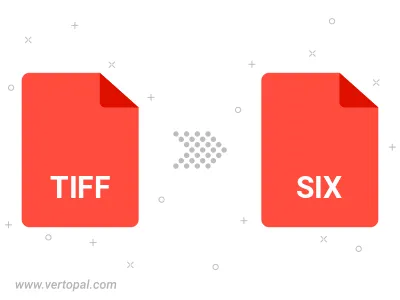Convert TIFF to SIX
Convert TIFF images to SIX format, edit and optimize images online and free.

The Tagged Image File Format (TIFF) is a flexible and adaptable image file format widely used in professional environments due to its ability to store high-quality images with rich detail. Developed by Aldus Corporation in 1986, TIFF files support various color spaces and compression methods, making them ideal for archival purposes, high-resolution scanning, and desktop publishing. Its versatility and robust metadata handling ensure that TIFF remains a staple in industries requiring precise image fidelity.
The SIX file extension, short for "six pixels", is a bitmap graphics format developed by Digital Equipment Corporation (DEC) for their terminals and printers. Introduced initially to send bitmap graphics to DEC dot matrix printers like the LA50, SIX later facilitated the transfer of soft fonts to terminals such as the VT220. This format encodes images using a series of six-pixel-high patterns, making it efficient for transmitting graphics over 7-bit serial links. Rediscovered around 2010, SIX remains in use with modern terminal emulators for tasks like video playback.
Upload a TIFF image by dragging it into the designated area.
Select customization options for TIFF to SIX conversion, then click Convert.
You will be redirected to the download page to obtain the SIX image.

Rotate TIFF to right (90° clockwise), to left (90° counter-clockwise), 180°, and convert it to SIX.
Flip TIFF vertically and/or horizontally (flop), and convert it to SIX.
Execute Vertopal CLI commands to convert TIFF image into SIX image.